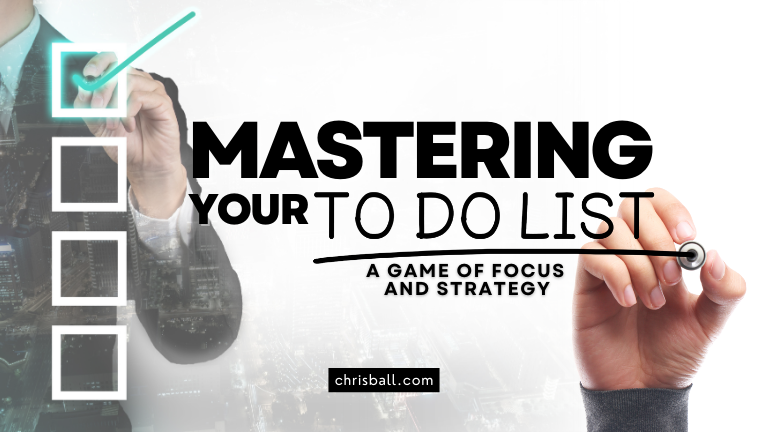In the intricate world of time management, handling an excessively long to-do list can feel like navigating a complex strategy game where each task demands not only your attention but also tactical foresight. My personal journey through the maze of overwhelming lists has taught me valuable lessons on prioritising effectively and eliminating inefficiency.
The Challenge of the 'Long List' Syndrome
My to-do lists, like those of many others, used to be dauntingly extensive—sometimes containing over seventy items. Such length didn’t just bring a sense of overwhelm; it muddled my ability to discern which tasks were essential. This confusion turned a potentially useful tool into a source of daily stress, making it hard to see the forest for the trees.
The Pitfalls of a Packed Schedule
A common trap of lengthy to-do lists is the psychological pull to address low-hanging fruit—tasks that are easier and quicker to tick off. This approach might offer the illusion of productivity, but in reality, it sidetracks us from engaging with tasks that provide substantial benefits. It’s akin to a gamer focusing on trivial side quests while neglecting the main storyline that advances them to higher levels.
I often ended days realising I had cleared numerous inconsequential items, yet the pivotal tasks—the ones that demanded more effort but promised greater rewards—remained untouched. This misalignment is a classic example of the Pareto Principle at play: a majority of the results often stem from a few key efforts.
Overcoming Decision Paralysis
The paralysis of choice is another significant hurdle. Faced with too many options, it’s easy to falter under decision fatigue. This can lead to procrastination or a scattershot approach to tasks, neither of which are conducive to productivity. Furthermore, without a clear view of priorities, it’s challenging to align daily actions with overarching goals, leading to a busy yet unproductive workflow.
Strategic Task Management
To escape this quagmire, I revolutionised my approach by treating my to-do list as a strategic game, where each task was a mission to be tackled with careful planning:
- Setting Priorities: I began by categorising tasks based on their impact and alignment with my long-term goals. High-priority tasks were treated as critical missions needing immediate action.
- Allocating Time Wisely: Designated time slots for high-priority tasks ensured they received the focused effort they required, much like a player dedicates resources to complete a crucial game level.
- Breaking Down Large Tasks: Complex tasks were decomposed into smaller, manageable actions—sub-tasks that could be approached incrementally, reducing the intimidation factor and making them more achievable.
- Rewarding Progress: Just as games provide rewards for completing levels, I instituted personal incentives for accomplishing significant tasks, enhancing motivation and satisfaction.
The Transformation
Adopting this gamified approach had profound effects. My work quality improved, and I spent my time on initiatives that significantly impacted my professional and personal goals. The shift from being overwhelmed by tasks to mastering them was empowering. It turned daily task management from a dreaded chore into an engaging and rewarding experience.
Reclaiming Life Beyond the List
Before implementing these strategies, my life was a blur of constant busyness that yielded little satisfaction. My workdays extended into evenings, filled with tasks that, while numerous, were low in value. This not only stunted my professional growth but also left me drained, with scant energy for family time or personal pursuits.
By streamlining my to-do list and focusing on what truly mattered, I reclaimed my time and energy. Work became more than just ticking boxes; it became a journey of meaningful progress. At home, I was more present and engaged with my family, and personal goals no longer took a backseat to professional demands.
Embrace the Game of Strategic Prioritization
Managing a to-do list effectively is not just about reducing its length; it’s about ensuring it reflects your highest priorities and aligns with your most impactful goals. It involves a blend of focus, foresight, and flexibility—qualities that allow you to navigate your daily responsibilities as skillfully as a gamer navigates strategic challenges.
As we delve deeper into the nuances of effective time management, consider your own to-do list. Is it a clear roadmap to success, or a tangled web of tasks? With the right strategies, you can transform it into a powerful tool that not only guides your daily efforts but also propels you towards your broader ambitions. This transformation from overwhelmed to in control is not just about managing time—it’s about managing life.
